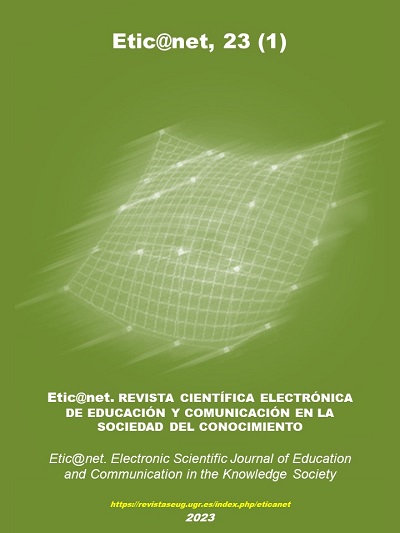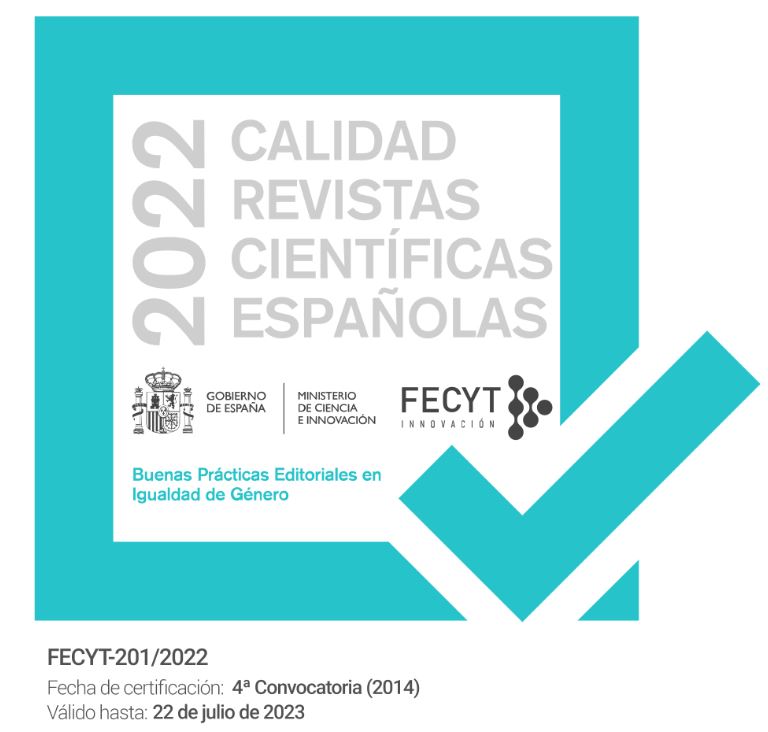Interactive dynamics, strategies in higher education to achieve professional competences
DOI:
https://doi.org/10.30827/eticanet.v23i1.27044Keywords:
competencias genéricas, competencias específicas, educación superior, estrategias educativas.Abstract
This research analyzes the inclusion of dynamic strategies in the acquisition of competences since the beginning of higher education. This section presents the research problem and its objective, which is to determine the impact of interactive dynamics in the classroom based on generic and specific competences for future professionals. We worked with first-level Economics students applying interactive dynamics to teach the contents of the syllable; and at the end of the semester, the level of acquired competencies was evaluated through a questionnaire, direct observation and evaluation of academic performance before and after the application of dynamics. The results show that cooperative work as a learning strategy has acceptance among students. It increases their capacity for organization, research and mutual resolution of problems, in addition to developing creativity and improving the quality of their work. The contrast of the findings of this research with other authors allow us to affirm that it is possible to apply interactive dynamics when there is a harmonious group environment, similar to other empirical studies. Moreover, although its use generates a greater interrelation between students and increases the skills acquired, its preparation demands time and additional effort from the professor, especially if they are large and heterogeneous group.
Downloads
References
Boekaerts, M. (2016). Engagement as an inherent aspect of the learning process. Learning and Instruction, 43, pp. 76-83, https://doi.org/10.1016/j.learninstruc.2016.02.001
Burgess, A., Kalman, E., Haq, I., Leaver, A., Roberts, C. y Bleasel, J. (2020). Interprofessional team-based learning (TBL): How do students engage? BMC Medical Education, 20(1) https://dx.doi.org/10.1186/s12909-020-02024-5
Crespo-Cabuto, Angélica., Mortis-Lozoya, Sonia Verónica. y Herrera-Meza, Sergio Raúl. (2021). Gestión curricular holística en el modelo por competencias: un estudio exploratorio. Formación universitaria, 14(4), pp. 3-14. https://doi.org/10.4067/S0718-50062021000400003
Figueras-Ferrer, E. (2021). Reflections upon the contemporary graphics. Future challenges in higher education. Arte, Individuo y Sociedad, 33(2), pp. 449-466. https://doi.org/10.5209/aris.68512
Fresneda, S. y Moros, E. (2021). Critical analysis of competencies-based education from Polo’s thought, Studia Poliana (23), pp. 151-175. https://dx.doi.org/10.15581/013.23.151-175
Fuentes, Y. Gina., Moreno-Murcia, Luís M., Rincón-Téllez, Diana C. y Silva-García, María B. (2021). Evaluación de las habilidades blandas en la educación superior. Formación universitaria, 14(4), pp. 49-60. https://dx.doi.org/10.4067/S0718-50062021000400049
González Losada, S. y Triviño García, M. Á. (2018). Las estrategias didácticas en la práctica docente universitaria. Profesorado, Revista de Currículum y Formación del Profesorado, 22(2), pp. 371-388. https://doi.org/10.30827/profesorado.v22i2.7728
Infante-Moro, A., Infante-Moro, J. C., Gallardo-Pérez, J. (2021). Análisis de las competencias digitales en el Máster de Turismo de la Universidad de Huelva. Campus Virtuales, 10(2), pp. 141-151. ISSN: 2255-1514
Jiménez, L. S., Vega, N., Capa M, E. D., Fierro Jaramillo, N. C. y Miguitama, P. Q. (2019). Learning teaching styles and strategies of university students of soil science. Revista Electrónica de Investigación Educativa, 21(1). https://dx.doi.org/10.24320/redie.2019.21.e04.1935
Keinänen, M. M. y Kairisto-Mertanen, L. (2019). Researching learning environments and students’ innovation competences. Education and Training, 61(1), pp. 17-30. . https://dx.doi.org/10.1108/ET-03-2018-0064
Méndez-Giménez, A. (2020). Academic, cognitive and physical outcomes of two strategies to integrate movement in classroom: Active lessons and active breaks. Sport TK, 9(1), pp. 63-74. d. https://dx.doi.org/10.6018/sportk.412531
Ocampo-Alvarado, J. C. y Ullauri-Ugarte, M. P. (2021). Factors for the acceptance and use of a learning management system in students of an ecuadorian university. Revista Electronica Educare, 25(3). https://dx.doi.org/10.15359/ree.25-3.10
Oberst, U., Gallifa, J., Farriols, N. y Vilaregut, A. (2009). Training Emotional and Social Competences in Higher Education: The Seminar Methodology, Higher Education in Europe, 34:3-4, pp. 523-533 https://dx.doi.org/10.1080/03797720903392243
Poort, I., Jansen, E. y Hofman, A. (2020). Does the group matter? Effects of trust, cultural diversity, and group formation on engagement in group work in higher education. Higher Education Research and Development, https://dx.doi.org/10.1080/07294360.2020.1839024
Rivera, L. J. I. (2021). Training in research competences as a pedagogical strategy for education committed to social welfare. Revista de Filosofía (Venzuela), 38, pp.125-140. https://dx.doi.org/10.5281/zenodo.4963246
Soria-Barreto, K. L. y Cleveland-Slimming, M. R. (2020). Perception of first year commercial engineering students on critical thinking and teamwork competencies. Formación Universitaria, 13(1), pp. 103-114. https://dx.doi.org/10.4067/S0718-50062020000100103
Vargas, C. L., Gallegos, V. M. y Jaramillo, M. L. (2020). Virtual Learning Objects in the teaching of Financial Accounting II of the Accounting and Auditing Career at Técnica del Norte University, International Conference of Digital Transformation and Innovation Technology (Incodtrin), pp. 103-109, https://dx.doi.org/10.1109/Incodtrin51881.2020.00032
Yang, X. Fu, J., Rodríguez-Sedano, F. y Conde, M. A. (2019). Enhancing students' academic performance through teamwork and classroom response systems: Case study with chinese students. Paper presented at the PervasiveHealth: Pervasive Computing Technologies for Healthcare, pp.732-737. https://dx.doi.org/10.1145/3362789.3362836
Downloads
Published
Issue
Section
License
The authors who publish in this journal agree to the following terms: The authors retain the copyright and grant the journal the right to be the first publication of the work as well as licensed under a Creative Commons Attribution License that allows others to share the work with an acknowledgment of the authorship of the work and the initial publication in this magazine. Authors are allowed and encouraged to disseminate their work electronically (for example, in institutional repositories or on their own website) before and during the submission process, as it may lead to productive exchanges as well as further citation. Earliest and greatest of published works (See The Effect of Open Access).













